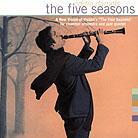October 1999
The original score for orchestra and solo violin was to remain untouched, the solo violin parts to be transposed to suit the vocal range of the clarinet. There would be written-out sections of superimposed jazz. These might broaden into full-scale jazz improv based on the harmonic progression of the various seasons. The orchestra would simultaneously maintain rapport with Vivaldi’s score and ensure eventual return to it. Other excursions would drift into even more unexpected territory: a jazz trio of piano, drums and bass. And then of course there was the sacrilegious idea to add a fifth season. If you’re not a clarinet player, the multidimensional enormity of this proposal can’t be fully appreciated. The classical literature for the clarinet is very limited and restricted to a few major solo works and innumerable chamber-music scores by lesser-order composers. The violin, next to the piano, is the solo instrument that has most captured the imagination of the first tier composers, and its repertoire is the envy of all others. The body of work available to the violinist is like that of a sumo wrestler compared to the mountain hermit of the clarinet. To be offered a chance to broaden the vocabulary must have strongly appealed to Eddie Daniels, while the monstrous technical demands might have initially had a more sobering effect. But this glove had been thrown in public, and Daniels gracefully bowed to pick it up. He chose his fellow duelists carefully: the Los Angeles Chamber Orchestra, and a jazz trio of Alan Broadbent on piano, Peter Erskine on drums and Dave Carpenter on bass. If you are familiar with Jacques Loussier’s Plays Bach oeuvre, you know how much swing is maybe not overtly obvious but nonetheless intrinsically inherent in Johann Sebastian, just waiting to be tapped by a clever Frenchman. But Vivaldi seems a bit more farfetched. You might doubt that it could be pulled off with Baroque. Loussier himself tried it on Telarc, and while his Bach remains the undisputed and pioneering masterwork of jive-talking classics, his Vivaldi just doesn’t yield as willingly. Eddie Daniels' venture is a much more fulfilling vision. He introduces the diction and inflections of jazz sparingly, enhancing the score more than altering it. When he goes off the charts, as he must when the jazz trio kicks in, he does so by shifting dimensions. You remember the ladder he took up into the sky, but then you’re up above the clouds and the vision is different. Sometimes the return to earth is sudden; at other times it’s very gradual, as if lowering down in an air balloon. But these side trips into the blue don’t alienate you from Antonio Vivaldi, and when you’re back in his familiar embrace you stay curious as to what particular phrase or harmonic progression might become the next elevator shift for Daniels' jazz spins. To appreciate Daniels' technical wizardry while he fearlessly navigates the solo violin passages through the seasons would require familiarity with his instrument. Even then, it’d be a bit too academic and dry, like marveling over a vineyard’s soil analysis without ever tasting its wine. Forgetting all technical analysis, Daniels' playing is sheer delight -- light, fleet-footed, sophisticated and utterly submitted to being a hollow bamboo for Vivaldi. His tone is chalumeau-like, slim and refined as befits the era had there been a clarinet. The transitions between the centuries, Vivaldi’s then and jazz’s now, are compellingly subtle and natural, even though this seems to be a contradiction in terms. But surely, rather than turning in his grave, Vivaldi would have offered a cheering toast and split his fingers in the universal V of victory: Viva Vivaldi! The Four Seasons is arguably one of the most popular classical works ever, adored and beloved even by folks who usually shun the sophisticated snobbery of so many concert halls. This recording offers an entirely new take, and does so with respect, charm and a willingness to abandon preconceptions and plunge into unknown territories. And if you live in one of those areas that seem eternally condemned to alternate between merely two seasons, doesn’t the notion of a fifth pique your interest just a bit? spring, summer, fall, winter -- and Eddie Daniels? GO BACK TO: |
 Eddie Daniels - The
Five Seasons
Eddie Daniels - The
Five Seasons![[Reviewed on CD]](../format/regcd.gif) "A
well-bred demon" is what Leonard Bernstein once called Eddie Daniels. Daniels by now
is widely acknowledged as one of the greatest jazz clarinetists alive. The aptly titled
1986 Breakthrough on GRP Records first showcased his unique and uncanny command
of both jazz and classical styles. While nearly all subsequent releases were excursions
into various jazz formats, Danny Weiss from Shanachie Records must have based his request
on the precedent of Breakthrough -- a request, namely, to do a new jazz and
classical version of Antonio Vivaldi’s Four Seasons.
"A
well-bred demon" is what Leonard Bernstein once called Eddie Daniels. Daniels by now
is widely acknowledged as one of the greatest jazz clarinetists alive. The aptly titled
1986 Breakthrough on GRP Records first showcased his unique and uncanny command
of both jazz and classical styles. While nearly all subsequent releases were excursions
into various jazz formats, Danny Weiss from Shanachie Records must have based his request
on the precedent of Breakthrough -- a request, namely, to do a new jazz and
classical version of Antonio Vivaldi’s Four Seasons.